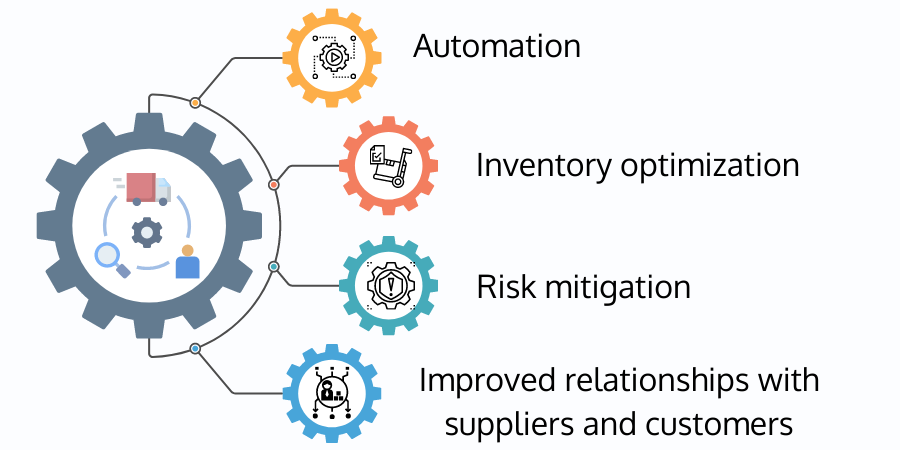
Effective supply chain management keeps your business operating smoothly, keeps you out of the headlines for the wrong reasons, and gives you a competitive edge. But what exactly is supply chain management, and why is it essential for businesses in the digital age? Let's get into it.
Supply Chain Management Explained
Supply chain management (SCM) is the process of delivering a product to a customer, all the way from sourcing the raw materials to the final delivery of the finished product. SCM covers various activities, including planning, logistics management, manufacturing technology, product lifecycle management, company asset management, and supply chain procurement.
In simple words, SCM is about handling the entire production flow of a product (goods or services) from start to finish. As part of this process, companies create a network of suppliers (who become the links in the chain) that move the product along the chain from raw materials to the companies that deal directly with end-users.
How Do Supply Chains Work?
Take a look around you. Everything you see, like your phone, the sofa you're sitting on, the fridge that cools your food, and so on, only exists because of supply chains. To understand how a supply chain works, let's look at an example.
Let's say you are a consumer looking for a new sofa. You find the sofa you like on an ecommerce website and place an order. Once this order has been processed (payment has been collected, and the customer receives a confirmation email), the order is passed to the SCM system. The SCM system then notifies suppliers, manufacturers, distributors, and any other parties that need to be involved in making the sofa and getting the sofa to your home.
The sofa is made by an Indian manufacturer, who now needs to source the raw material for your sofa and any upcoming sofa orders they have. To do this, they contact their upstream suppliers. The raw materials could be wood for the sofa frame, various fabrics, foam for the sofa cushions, and fastenings to assemble the frame and soft materials. A logistics company then arranges these components to be delivered to the Indian factory for manufacturing. Depending on the cost and distance, the logistics company might transport these raw materials by rail, road, or air freight.
Once the raw materials reach the factory, the factory will build the sofa according to the agreed-upon requirements, including quality and safety specifications, budget, and timescales.
Next, the finished sofa needs to be delivered to the customer's location. For example, let's say you live in the US - the sofa will need to travel via a shipping container. For this to happen, the freight forwarder (the company transporting the sofas to the ship) will need to fill in some paperwork, including a declaration of goods, customs paperwork, and ensure they have leased the necessary space on the carrier.
The sofa then journeys to the US, where it will be checked by customs and forwarded to an internal logistics company. This company will then arrange for your sofa to be delivered to your house!
Why is Supply Chain Management Essential?
The goal of SCM is to maximize customer value and achieve a continual competitive advantage. Essentially, by consciously managing all steps in the supply chain, you ensure products move through the process as effectively and efficiently as possible. Most supply chain management activities focus on containing costs and improving efficiency. Typically, they do this by using lean and just-in-time methodologies. In practice, this means that companies only place new orders when inventory gets low (thereby cutting down on waste and surplus).
A faltering supply chain can harm economic activity and lead to poor reputations for businesses when customers don't receive their product on time.

Why Use Supply Chain Management Software?
Despite supply chains being the core of global economies, many companies still use outdated and inefficient methods and technologies. These outdated systems create many problems, including late shipments and delayed production. Here are the reasons to invest in modern SCM systems with that in mind.
- Automation: SCM software utilizes advanced automation to eliminate time-consuming and laborious tasks involved in inventory management and coordinating suppliers. With this automation, you can vastly reduce errors across the supply chain.
- Inventory Optimization: SCM improves your ability to forecast the demand of products and prepare ahead of time.
- Risk Mitigation: SCM software can highlight any upcoming risks in the supply chain network so you can make alternative arrangements.
- Improved Relationships with Suppliers and Customers: SCM helps streamline processes and offers tools to help you communicate and collaborate effectively with suppliers. This means you can manage the daily supply chain activities more closely and strengthen your relationships. Additionally, an effectively managed supply chain leads to happy customers. Not only that, but SCM software often includes tools to help you engage your audience or manage any product complaints.



























 Batoi Corporate Office
Batoi Corporate Office